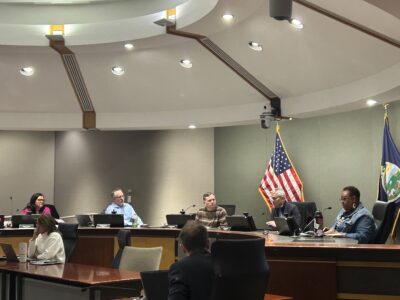Officials react to Lawrence and Douglas County landing on the DHS list of sanctuary communities

photo by: AP News
In this Feb. 7, 2017, photo released by U.S. Immigration and Customs Enforcement, an arrest is made during a targeted enforcement operation conducted by U.S. Immigration and Customs Enforcement aimed at immigration fugitives, re-entrants and at-large criminal aliens in Los Angeles.
Douglas County’s sheriff said it was both inaccurate and unfair for the county to be labeled a sanctuary city for illegal immigrants by the federal government last week.
But Sheriff Jay Armbrister said he also is continuing with his practice that immigration enforcement is the job of the federal government and not local jurisdictions. He said that beyond honoring valid Immigration and Customs Enforcement, or ICE, warrants, he instructs his deputies to avoid getting involved with ICE activity unless necessary.
“I have given instructions to deputies to assist federal immigration enforcement officers only if they might need assistance in some type of emergency with an agent being in physical danger, but otherwise we would not be involved,” Armbrister said.
The City of Lawrence and Douglas County were named sanctuary jurisdictions by the Department of Homeland Security last week on a list of over 500 communities that in accordance with an executive order from President Donald Trump risk losing federal funds unless they moved to comply with the administration’s interpretation of federal law, as the Journal-World reported.
The list was suddenly removed from the DHS website on Sunday after nationwide pushback from law enforcement agencies.
While the status of the communities on the list isn’t currently clear, Armbrister told the Journal-World that he was surprised that Douglas County was named on the list.
“We were surprised to remain on the list, and we believe this to be incorrect and frankly very unfair,” Armbrister said.
He said his office and jail have honored ICE warrants as they are received from Customs and Immigration officials. He said there has only been one time that a person detained in the Douglas County Jail during his administration has been released before ICE agents arrived at the jail to take custody of the individual. That individual was released after 72 hours and her attorney had filed a writ of habeas corpus.
However, there are times that immigration officials don’t have a warrant, but rather have a legal document called a “detainer” that seeks for the Douglas County Jail to hold an individual in order for an ICE agent to take custody on alleged immigration offenses. The sheriff’s office has not always honored those detainers, which, unlike a warrant, are not signed by a judge.
That may be an issue that led to Douglas County’s inclusion on the recent list.
“In our communications with ICE representatives, our understanding is it primarily had to do with past practices of not accepting detainers for individuals in custody on local or state charges,” Armbrister said.
Armbrister told the Journal-World in Janurary that his office would not detain residents under ICE Form I-274a, a request sent by ICE to a local law enforcement agency to hold a person suspected to be in the country illegally for a limited time.
Armbrister said that in response to being named on the list, he has reached out to DHS for further explanation as to why Douglas County was named as a sanctuary jurisdiction.
“We feel like the goalposts have been moved on us, and this is now merely a subjective process where one person gets to decide our status on this list based on their opinion,” Armbrister said.
He said being placed on the list without due process or any way to appeal was “simply unfair.”
In regards to federal funding that the Sheriff’s Office may lose, Armbrister said he isn’t concerned because his office receives little to no federal dollars.
However, he is concerned because it could jeopardize federal funding for the county at large.
A spokeswoman with the Douglas County Administrator’s Office did not respond to the Journal-World’s inquiry about the county being designated a sanctuary jurisdiction.
At Lawrence City Hall, spokeswoman Cori Wallace said city commissioners specifically had taken action about two years ago to clarify that their stance of being a “welcoming city” did not mean that the city was taking specific action that would categorize the city as a sanctuary community for illegal immigrants.
“The City of Lawrence made a modification about two years ago to Ordinance 10108 to comply with a change in state law. It was the opinion of the then State Attorney General and now US Congressman (Rep. Derek Schmidt) that we were in compliance by that action,” Wallace said in an email.
Wallace said that other lingering questions about whether the city risked losing any federal funding or what other impact the designation could have was being discussed by city staff.
The Lawrence Police Department declined to comment as to why the city may have been named on the list. Department spokesperson Laura McCabe said that Lawrence police comply with the laws that are on the books, both federal and local, and referenced the department’s and city’s policies.
“In alignment with the City of Lawrence philosophy, the Lawrence Police Department acknowledges the City is an inclusive community that values immigrants and the diversity they bring to the City’s cultural fabric, economic growth, and global competitiveness,” the first line of the department’s policy reads.
The policy directs officers to create an environment where people no matter their immigration status should feel comfortable contacting police for assistance. The city intends to comply with all local, state, and federal laws while discouraging any unlawful discrimination, according to the policy.
“No member shall stop, question, arrest, or detain any individual based solely upon actual or suspected citizenship or immigration status,” according to the policy.
If during an interaction with a person, an officer learns of an ICE warrant, the department will contact ICE to verify that the warrant is in connection with a criminal act.
“If the immigration warrant is for a criminal violation and has been issued by a federal judge or magistrate, members will honor this warrant and handle it in the same manner as any other criminal warrant,” according to the policy.







